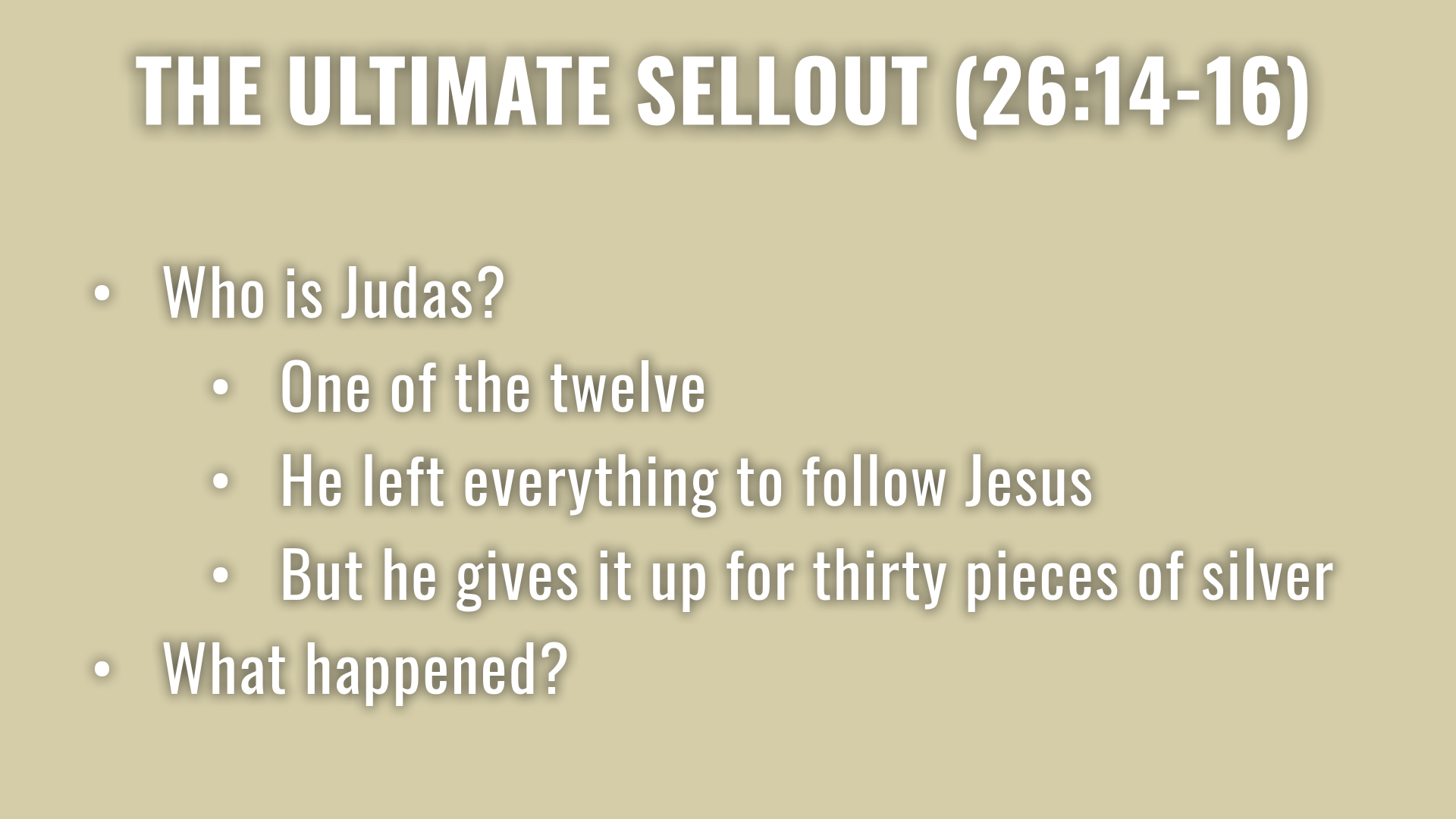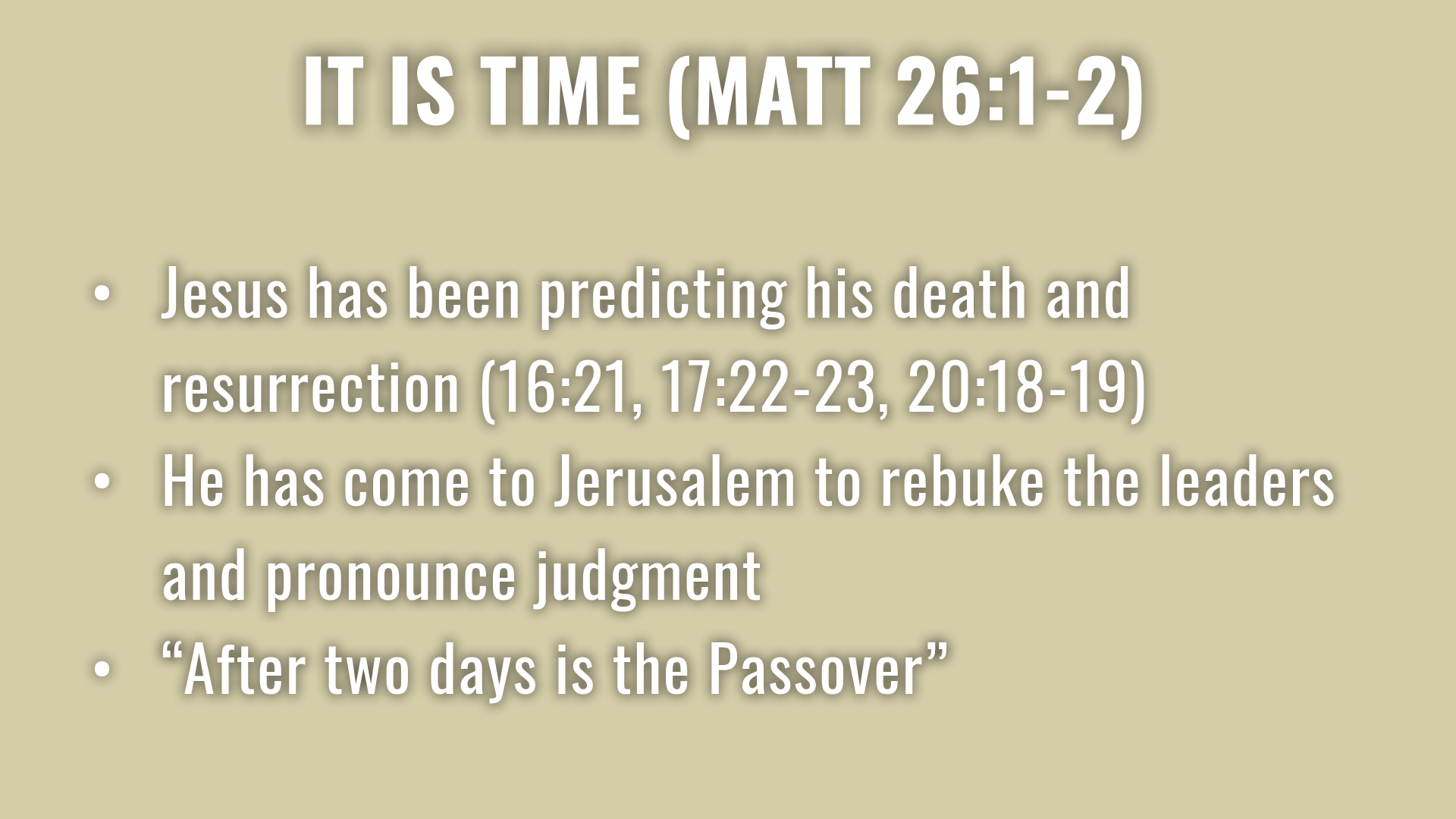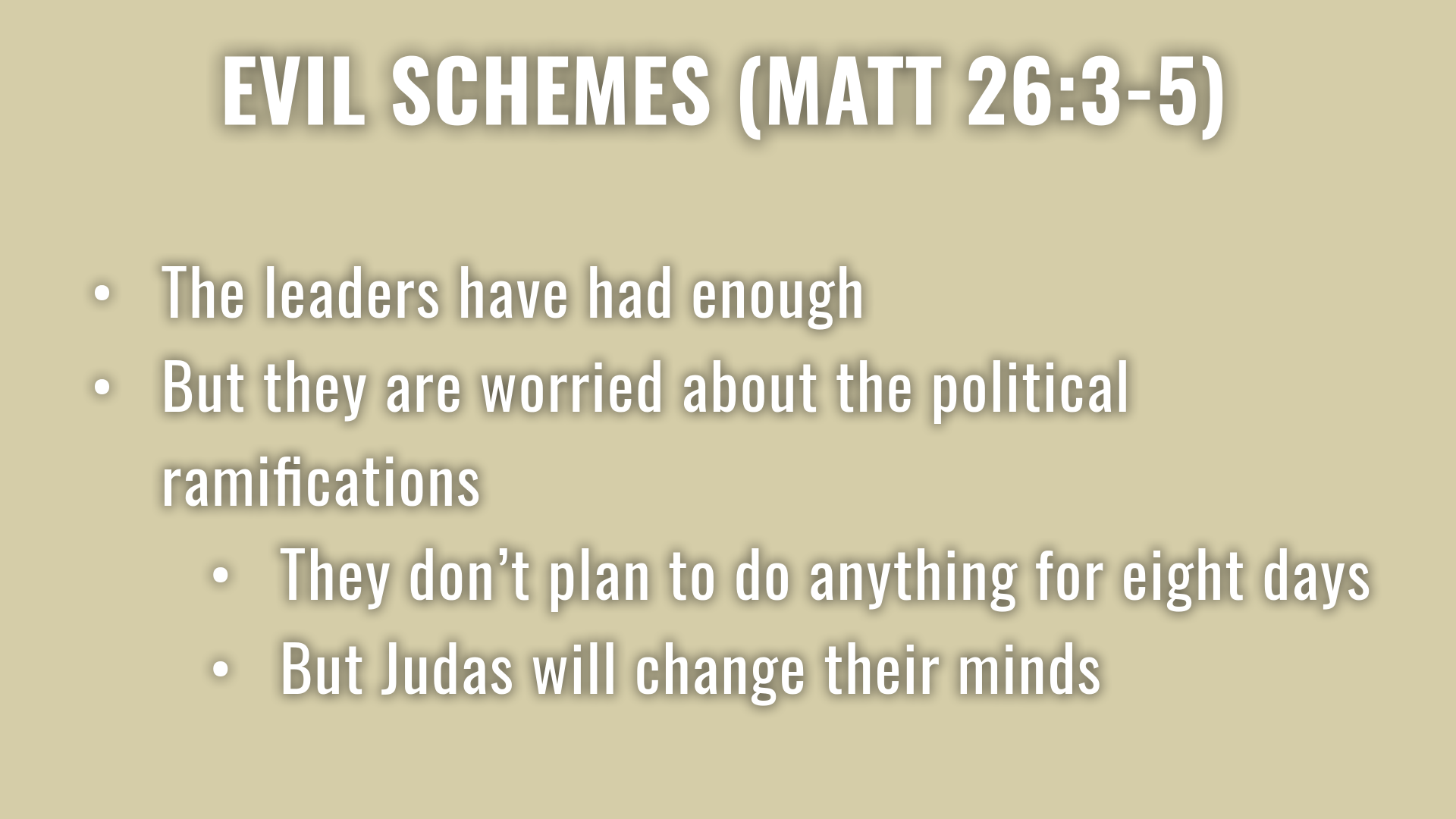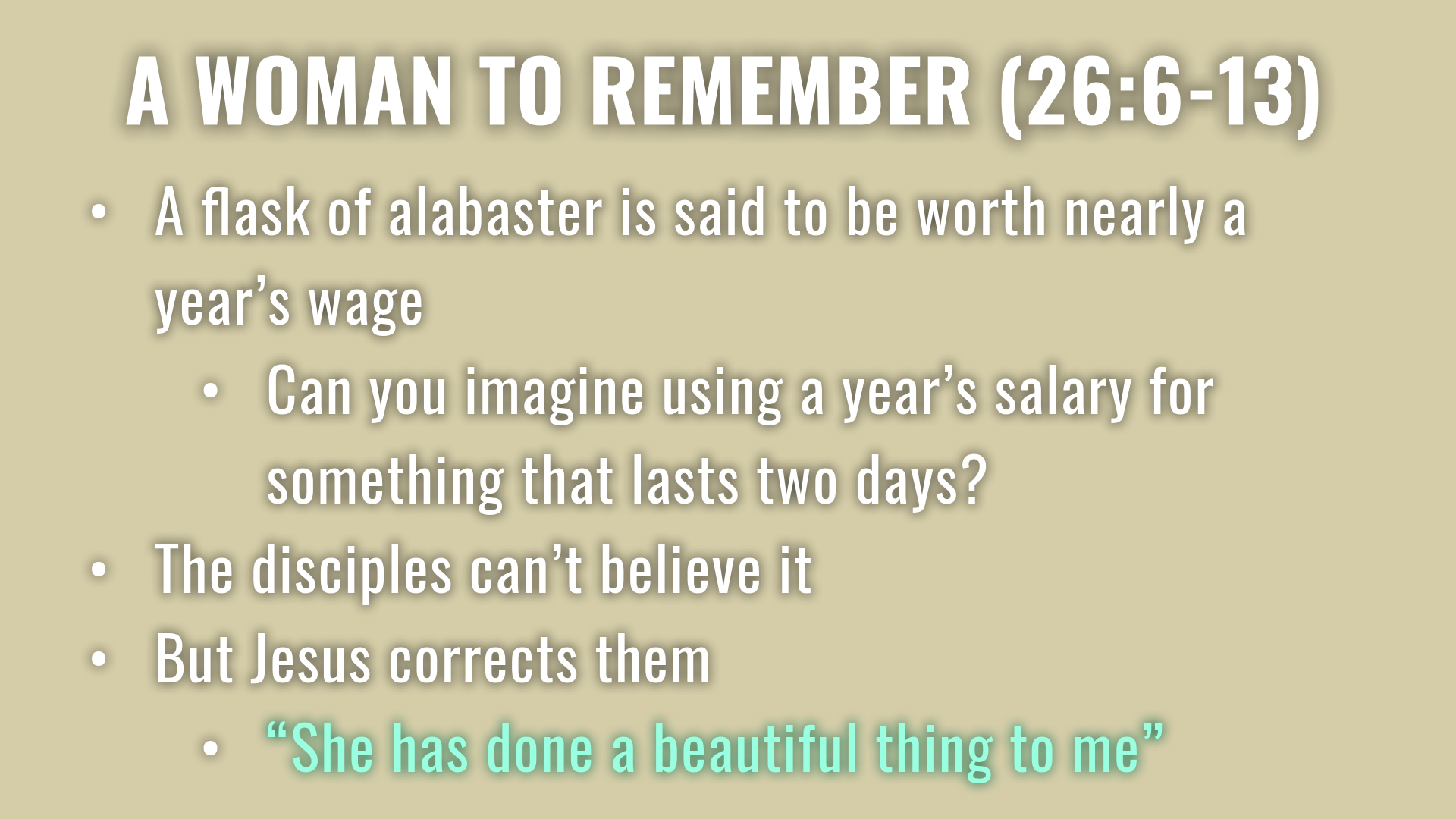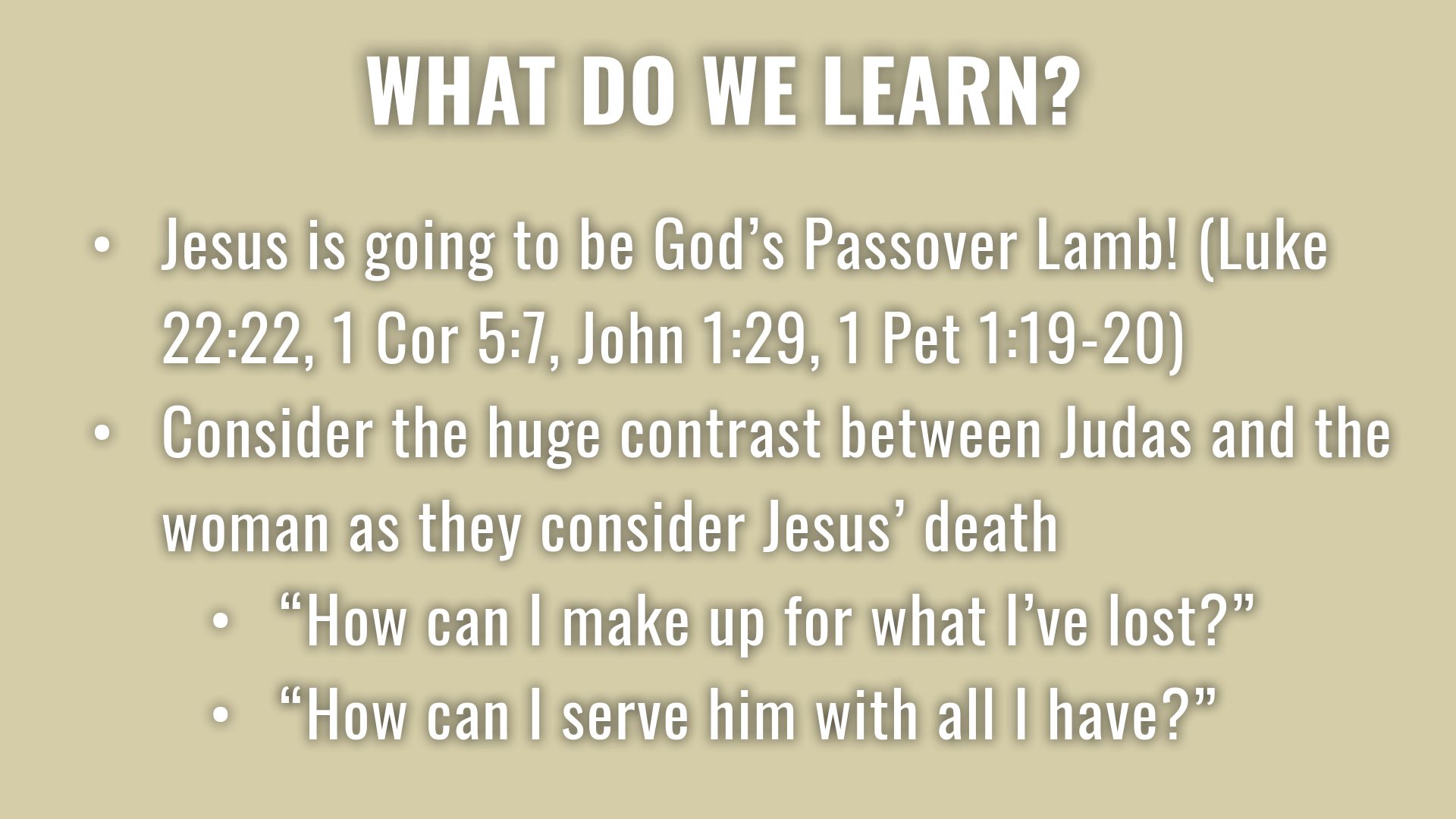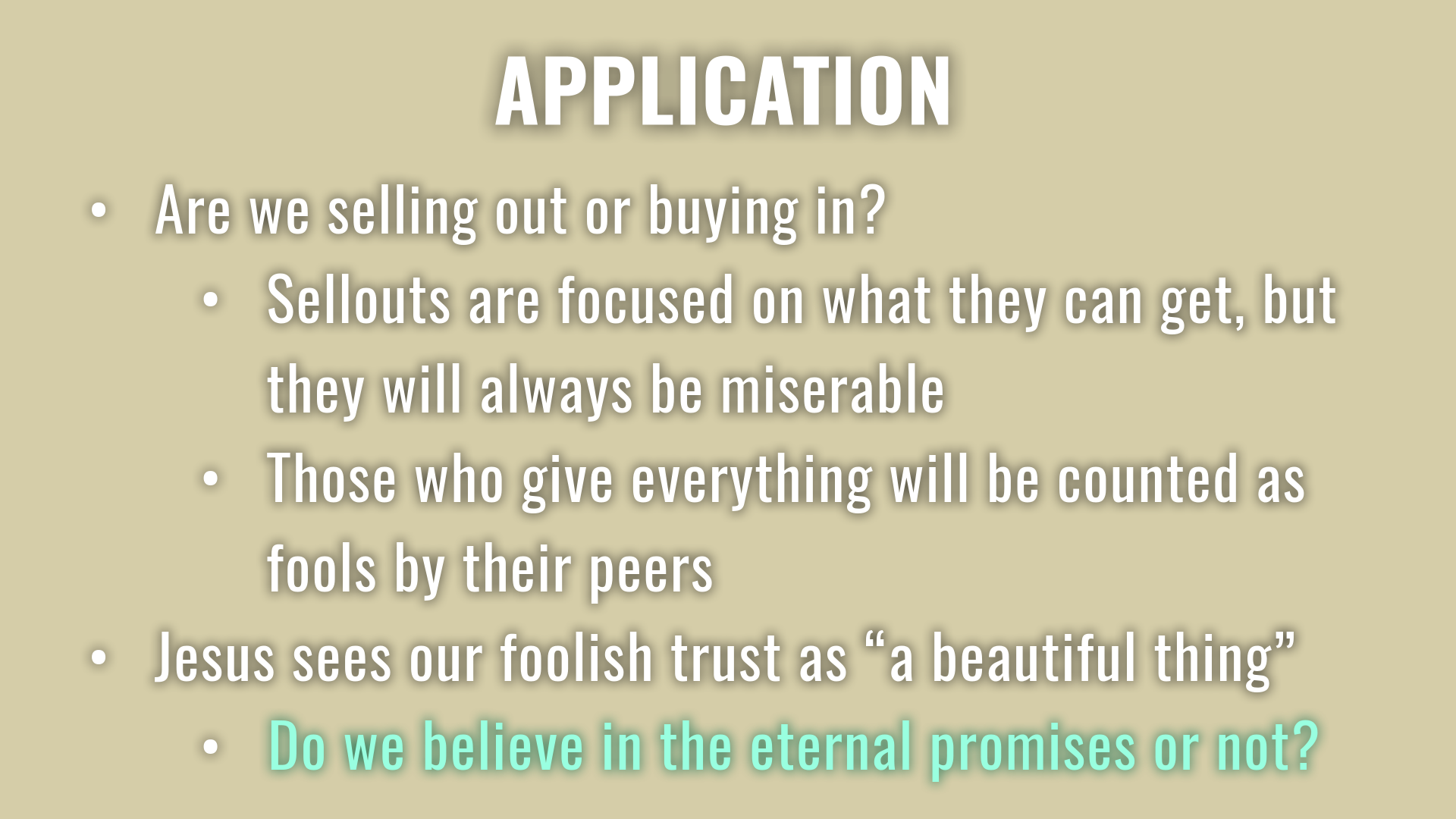Do You Have A Price? (Matthew 26:1-16)
What is a sellout? Who is a sellout? We don’t like the term sell out, but isn’t that what everyone does today? Our society doesn’t bat an eye when people sell out because it is ambiguous. This is the status of our society right now. We might call someone a sellout one week, then support them the next. It just doesn’t matter. To be a sellout is to knowingly act against or betray a previously held allegiance so that they can acquire some benefit. In most cases, it’s all about the money.
Where do we draw a line? What do we give our allegiance to? How strongly are we devoted to Christ and his kingdom? Are we or will we become sellouts?
The Ultimate Sellout
Today, we will begin to look at the crucifixion of Jesus. We will start to understand how and why he was crucified. The details of this story should be highly alarming to us. We have to read this text with introspection. Men and women who resemble us are going to betray Jesus and call for his murder. Why do they do that? What happens inside of us that pushes us to such evil? The details of this story should also encourage us. We have to understand that Jesus went through all of this willingly. He did it with a strong desire to save all of us even though we are evil. He endured tremendous pain and suffering for us to see his love and be transformed.
To start our study of this section, we will study the biggest sellout in history. To do this, I would like for us to do something a little different. We will begin with the end of what we are studying today.
Matthew 26:14--16 (ESV) --- 14 Then one of the twelve, whose name was Judas Iscariot, went to the chief priests 15 and said, “What will you give me if I deliver him over to you?” And they paid him thirty pieces of silver. 16 And from that moment he sought an opportunity to betray him.
Here is the greatest mistake ever made. Judas Iscariot was a man who also left everything to follow Jesus. He witnessed all of the signs and miracles of Christ. He was there when Jesus taught on the mountain. He was there when Jesus correctly answered every religious leader’s question. Jesus didn’t treat him any differently from the rest of the disciples. None of the disciples looked at him like he was weird. He was one of the closest friends of our Lord. But this text tells us that Judas sold out. He wanted money in exchange for Jesus. It turns out that he was not willing to renounce all to follow Jesus. What happened to Judas? Why did he change course?
It Is Time
In our studies of the book of Matthew, Jesus has been foretelling his death and resurrection. On three separate occasions, he has tried to prepare his disciples.
Matthew 16:21 (ESV) --- 21 From that time Jesus began to show his disciples that he must go to Jerusalem and suffer many things from the elders and chief priests and scribes, and be killed, and on the third day be raised.
Matthew 17:22--23 (ESV) --- 22 As they were gathering in Galilee, Jesus said to them, “The Son of Man is about to be delivered into the hands of men, 23 and they will kill him, and he will be raised on the third day.” And they were greatly distressed.
Matthew 20:18--19 (ESV) --- 18 “See, we are going up to Jerusalem. And the Son of Man will be delivered over to the chief priests and scribes, and they will condemn him to death 19 and deliver him over to the Gentiles to be mocked and flogged and crucified, and he will be raised on the third day.”
He knew what was about to happen to him, but he went anyway. Why would he do that? He has a purpose and a plan. When he arrives in Jerusalem, he curses a fig tree to represent how fruitless Jerusalem was. Then, he went into the temple and cleansed it, taught about the kingdom of heaven, answered every testing question, spoke against the hypocrisy, told the disciples about the destruction of Jerusalem, prepared his disciples for a tribulation that would happen before that destruction, and foretold a final judgment day. All of that happened in a couple of days.
Maybe all of the news about suffering didn’t sound good to Judas. Maybe he didn’t like the idea that Jesus was about to die and they were going to have to remain faithful without him. He probably saw his life going in a different direction with Jesus being the king of Israel and him ruling with Jesus.
Now, we read about Jesus’ final words of the sermon.
Matthew 26:1--2 (ESV) --- 1 When Jesus had finished all these sayings, he said to his disciples, 2 “You know that after two days the Passover is coming, and the Son of Man will be delivered up to be crucified.”
Maybe these final words were the last straw. Jesus reaffirms the plan to be crucified by the religious leaders. But this time, he tells us a timeline. He says, “After two days is the Passover, and the Son of Man will be delivered up to be crucified.” He knows when it will happen. Now is the time. At the same time, we read about the chief priests and elders planning to kill him.
Evil Schemes
Matthew 26:3--5 (ESV) --- 3 Then the chief priests and the elders of the people gathered in the palace of the high priest, whose name was Caiaphas, 4 and plotted together in order to arrest Jesus by stealth and kill him. 5 But they said, “Not during the feast, lest there be an uproar among the people.”
Notice that they gather at the palace of the high priest, Caiaphas. Caiaphas is portrayed as an evil man. During this time, all of the high priests were bribing their way into the position. Without a true king, they held all the power of influence over the people. He seems to be the most corruptible high priest because he holds the position much longer than those before or after him. Rome liked him, and he knew how to make them happy and retain his power.
All of the chief priests and elders meet with him to figure out how they might arrest him and kill him without the people getting upset. Interestingly, they decide not to do it during the Passover feast. They don’t want to stir up a mob that disrupts the feast. So they decide to wait eight days until after the Passover and Feast of Unleavened Bread. That’s odd. Jesus believes it will happen at Passover in two days, but they don’t want to kill him until afterward. Judas is the one who changes their minds. He gives them a way to kill Jesus without causing an uproar.
A Woman To Remember
Before we read about Judas going to the elders and religious leaders, Matthew tells us why Judas sold out Jesus.
Matthew 26:6--13 (ESV) --- 6 Now when Jesus was at Bethany in the house of Simon the leper, 7 a woman came up to him with an alabaster flask of very expensive ointment, and she poured it on his head as he reclined at table. 8 And when the disciples saw it, they were indignant, saying, “Why this waste? 9 For this could have been sold for a large sum and given to the poor.” 10 But Jesus, aware of this, said to them, “Why do you trouble the woman? For she has done a beautiful thing to me. 11 For you always have the poor with you, but you will not always have me. 12 In pouring this ointment on my body, she has done it to prepare me for burial. 13 Truly, I say to you, wherever this gospel is proclaimed in the whole world, what she has done will also be told in memory of her.”
This part of the story tells us that Jesus was in Bethany, a small city outside Jerusalem. He was at the house of Simon, the leper, but I imagine that Simon used to be a leper or else everyone would be avoiding him. Jesus had likely healed Simon. While he was there, a woman came in with a flask full of alabaster. At that time, a flask with oil like this would be worth nearly a year’s wage. She breaks the flask and pours it over Jesus’ hair. Now, can you imagine someone spending a year’s income on something like this? Then, could you imagine them pouring it all out at once? One entire year’s income is spent on something that will smell nice for maybe a day or two. Even a grand wedding feast doesn’t cost a year’s salary. This seems a bit wasteful.
We read that some of the disciples were indignant. They were upset over the wastefulness of it. If they had a flask with $70k, they would be selling it so that they could at least give it to the poor. They look down their noses at luxurious living because they are living a sacrificial lifestyle. But look at what Jesus asks them. He says, “Why do you trouble this woman? For she has done a beautiful thing to me.” Mark’s account says that “she did all that she could.” This woman has just spent a ton of money on Jesus.
Why did she do it? Jesus says, “You always have the poor with you, but you will not always have me. In pouring this ointment on my body, she has done it to prepare me for burial.” This woman believed what Jesus had said. She knew that Jesus would be crucified at Passover because he said that he would. Knowing this affected the way that she looked at her time on earth. She only had a couple more days to give Jesus all that she could give him. So she went as big as she could. She gave it all to show Jesus how much he means to her. It is truly a beautiful thing she has done.
Betrayal
Matthew 26:14--16 (ESV) --- 14 Then one of the twelve, whose name was Judas Iscariot, went to the chief priests 15 and said, “What will you give me if I deliver him over to you?” And they paid him thirty pieces of silver. 16 And from that moment he sought an opportunity to betray him.
Now, when we read about Judas’ betrayal, we understand it a little differently. Judas saw that and determined that there was nothing to be gained physically from following Jesus. His opportunity for monetary gain is now, and it’s not going to come from Jesus. Soon Jesus will be a name everyone forgets because he is just a crazy guy who has a death wish. So he better get all that he can for himself before he loses the opportunity. He better seize the day and make the most of this time. He goes to the religious leaders and asks them, “What will you give me?” Judas has weighed what Jesus offers, and now he is weighing what the chief priests offer. Apparently, he feels that 30 shekels of silver are more valuable. He sells his inheritance for a bowl of stew-like Esau.
What Does It Mean?
As we read through this account and learn about Judas and this woman, do we see the contrast? Judas and the disciples were so focused on the here and now that they could not live for eternity. When the woman comes forward and spends all she has on Jesus, they can’t understand it. Why would she do something so foolish? They start chastising her for this. They don’t get it. They are still looking for what they can get out of Jesus instead of what they can give him.
But this woman wanted to give Jesus everything. How could someone be so devoted and dedicated to the Lord? How could someone donate so much? She believed in the words and teachings of Jesus. She believed that the crucifixion would result in resurrection and salvation.
I find it most interesting that Jesus tells us that he will die on Passover. Passover is a day when everyone would kill their lamb in remembrance of God passing over Israel on the final plague in Egypt. It is a picture of God saving his people from death and delivering them from slavery. Jesus becomes God’s lamb. When all of Israel would be sacrificing their lambs, God would sacrifice his lamb for us.
Luke 22:22 (ESV) --- 22 For the Son of Man goes as it has been determined, but woe to that man by whom he is betrayed!”
1 Corinthians 5:7 (ESV) --- 7 Cleanse out the old leaven that you may be a new lump, as you really are unleavened. For Christ, our Passover lamb, has been sacrificed.
John 1:29 (ESV) --- 29 The next day he saw Jesus coming toward him, and said, “Behold, the Lamb of God, who takes away the sin of the world!
1 Peter 1:19--20 (ESV) --- 19 but with the precious blood of Christ, like that of a lamb without blemish or spot. 20 He was foreknown before the foundation of the world but was made manifest in the last times for the sake of you
Isaiah 53:7 (ESV) --- 7 He was oppressed, and he was afflicted, yet he opened not his mouth; like a lamb that is led to the slaughter, and like a sheep that before its shearers is silent, so he opened not his mouth.
She laid it all down at Jesus’ feet because he laid his life down for her. He gave himself for all of us.
Application
Are we selling out or buying in? There are two different ways we might be following Jesus. One way is with a focus on what Jesus can get us in this life. This is Judas’ way of thinking. He wanted the get out of jail free card and the eternal blessing from God, but he also wanted to enjoy the things of this world. When faced with suffering for Jesus or living a life of comfort, he chose comfort. He sold out Jesus for comfort. The sad thing is that he never really enjoyed the comfort. It was all just a ruse. It was all a deceptive plot of Satan to convince him that he could enjoy a life without Jesus after having him. Is this you? Do you trade opportunities to serve the Lord for opportunities to have a good time or to make more money? Do you only give Jesus what you think you have to, or are you like the woman?
She was all in. She bought into the promises Jesus made to her. She believed that the wealth of this world would deteriorate, but the wealth in heaven remained. So she gave all to serve Jesus. I have watched men and women give everything. I have known men who left this country of comfort and ease to go somewhere difficult and uncomfortable so that they could reach the lost. How do you feel about them? Are you like the disciples, saying that was foolish. They could have done work here. When someone donates an extravagant gift, do you think, “That’s a foolish thing to spend money on?” Why not say, “They have done a beautiful thing. Why not praise God for the faith of those around us and the example they have set for us.
Jesus says that all who hear the gospel will remember this woman for this extreme act of faith. She believed when no one else did. She gave all even though it looked foolish! What love and adoration were in her heart. I pray that love, adoration, and faith are developed in me. I pray that I act foolishly because I believe these promises and want eternal blessings more than physical blessings.
Conclusion
There are times when we lose sight of how valuable Jesus is. This section shows us that having a relationship with Jesus is worth more than anything we have in this life. The fantastic thing is that Jesus offers us this relationship free of charge. Don’t let that throw you off. Just because it is free doesn’t mean it’s not worth all the money in the world. Sometimes if we throw free on something, people think there are strings attached. They think it will be something like a timeshare where they hook you for five hours during your vacation. If you aren’t in the market for a timeshare, those free tickets to the Tennessee aquarium aren’t worth five hours.
I will tell you upfront. Serving Jesus faithfully will cost you more than anything else in this life. But it’s worth more than everything you or I could ever own. Jesus provides a way to be with God for all eternity through the forgiveness of sins.


